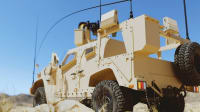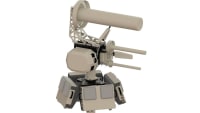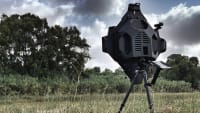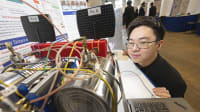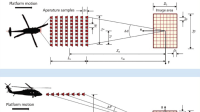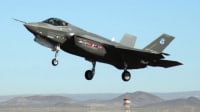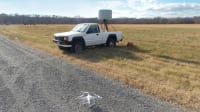Army Fast-Tracks Adaptable Radars for Congested Environments

A new machine learning approach could improve radar performance in congested environments. Researchers from the U.S. Army Combat Capabilities Development Command, now known as DEVCOM, Army Research Laboratory and Virginia Tech developed an automatic way for radars to seamlessly operate in congested and limited spectrum environments created by commercial 4G LTE and future 5G communications systems.
“Future implementations of this algorithm into Army legacy and developmental radars will provide unprecedented spectrum dominance for soldiers,” said Army researcher Dr. Anthony Martone. “This will enable soldiers to use their radars for problems such as tracking incoming targets while mitigating interference to maximize target detection range.”
The researchers examined how future DOD radar systems will share the spectrum with commercial communications systems. The team used machine learning to learn the behavior of ever-changing interference in the spectrum and find clean spectrum to maximize the radar performance. Once clean spectrum is identified, waveforms can be modified to best fit into the spectrum.
This research is part of a larger defense program to implement adaptive signal processing and machine learning algorithms onto software-defined radar platforms for autonomous real-time behavior.
“With development of this algorithm, this capability is fast-tracking from a concept to a Defense program of record in less than eight years,” Martone said. “This is a notably expedited cycle compared to the more typical 30-year cycle, which will more quickly provide secure communications for soldiers.”
The team is leading future research and development efforts to make cognitive radar possible and sharing new research areas within the radar community, with the intent to continue development using more advanced software-defined radar platforms.
Top Stories
INSIDERManufacturing & Prototyping
![]() How Airbus is Using w-DED to 3D Print Larger Titanium Airplane Parts
How Airbus is Using w-DED to 3D Print Larger Titanium Airplane Parts
INSIDERManned Systems
![]() FAA to Replace Aging Network of Ground-Based Radars
FAA to Replace Aging Network of Ground-Based Radars
NewsTransportation
![]() CES 2026: Bosch is Ready to Bring AI to Your (Likely ICE-powered) Vehicle
CES 2026: Bosch is Ready to Bring AI to Your (Likely ICE-powered) Vehicle
NewsSoftware
![]() Accelerating Down the Road to Autonomy
Accelerating Down the Road to Autonomy
EditorialDesign
![]() DarkSky One Wants to Make the World a Darker Place
DarkSky One Wants to Make the World a Darker Place
INSIDERMaterials
![]() Can This Self-Healing Composite Make Airplane and Spacecraft Components Last...
Can This Self-Healing Composite Make Airplane and Spacecraft Components Last...
Webcasts
Defense
![]() How Sift's Unified Observability Platform Accelerates Drone Innovation
How Sift's Unified Observability Platform Accelerates Drone Innovation
Automotive
![]() E/E Architecture Redefined: Building Smarter, Safer, and Scalable...
E/E Architecture Redefined: Building Smarter, Safer, and Scalable...
Power
![]() Hydrogen Engines Are Heating Up for Heavy Duty
Hydrogen Engines Are Heating Up for Heavy Duty
Electronics & Computers
![]() Advantages of Smart Power Distribution Unit Design for Automotive...
Advantages of Smart Power Distribution Unit Design for Automotive...
Unmanned Systems
![]() Quiet, Please: NVH Improvement Opportunities in the Early Design...
Quiet, Please: NVH Improvement Opportunities in the Early Design...





